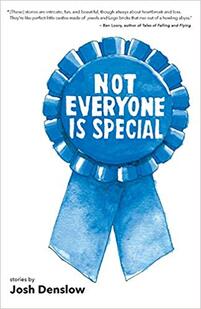Each of us finds a way to cope with the hurdles and pain that life throws our way. Some turn towards their work, others to more destructive means. Then, there’s Josh Denslow. In his collection of stories Not Everyone is Special, Denslow covers a range of topics with his characters: from being a child of divorce, to being a survivor in the aftermath of a friends’ suicide, to being a little person in today’s world. His approach is to use humor not only to build up the narrative in each story, but show how people use it as a form of self-preservation and self-defense in ways that are true to real life, even when he is putting a character in a world where people have superpowers like being able to get the wrinkles out of shirts by patting them down with their hands or extending and retracting their facial hair in real time. In the title story, Denslow tackles the issue of divorcees who can’t move on by having the readers follow Cameron, a single dad who is trying to discover his superpower in a world filled with mundane superpowers. Cameron is obsessed with the idea that if he just discovers his superpower, it will somehow bridge the gap that split him and his ex wife apart so that their family can be restored. The struggles that Cameron experiences are often made easier for him to bear through the use of his own internal dialogue every time he encounters a failure to discover his superpower: “But then again, I know a guy who can turn pepperoni into sausage. He envies my ignorance.” In a world where superpowers range from walking on water to being able to change your eye color, Denslow is able to convey one simple message: a superpower doesn’t have to define you.
One particularly difficult but overlooked topic that people don’t often talk about is being a survivor of something as heart wrenching as someone close to them committing suicide. In “Punch” the humor that Denslow utilizes with his character skirts the line of being on the nose without ever crossing it: “After the preacher talked about how Chuck was called away too early (no mention of how), I talked about the time I hit him and broke his glasses. I got a few laughs, choked with tears of course, but it felt good to smile while remembering my best friend. I almost told them about the time I beat his high score in Tomb Blaster, but I didn’t want to brag. It was his day after all.” Denslow builds a narrative around a character that dives headfirst into events that he has absolutely no place in rather than come to terms with the lack of authority he has in his own life. The pervasive feeling of the story was that there was something he could have done to prevent Chuck from taking his own life but the reality was that there was nothing he could do. Humor as a tool can be tricky and there are times when it felt like the humor was a square peg trying to fit into a circular hole. In “Too Late for a Lot of Things” the story revolved around the plight of Keith, a person of short stature that is constantly plagued by his height in one way or another. Playing an elf in a Christmas themed amusement park that is open year round, the reader is confronted early and often with the passive shaming that the character has to endure. While this is done effectively at times to make the reader uncomfortable, the humor that usually acts as the balancing measure on this scale falls short of building empathy for Keith: “I’m only steps away when I’m suddenly pushed backwards, as if Charlie has a force field around him. The candy cane smacks into my face, and I land flat on my back.” The idea of a little person charging at someone who has just mocked them because of their height only to fall short in acting upon their aggression came off as a bit more slapstick comedy than the usual quick jabs of insightful humor that are woven throughout the rest of the collection. The shortcomings of one story however are not reflective of the thing that Denslow does best: use humor as a tool. It comes in quick spurts and never leaves the reader wondering how callous the author or characters are. Instead, we are left thinking about times we have reacted in a similar manner when tragedy has reared its’ ugly head in our lives and some sense of comfort comes with knowing that the way you reacted in those moments doesn’t make you a monster. In those times, it is kind of nice to not be so special.
0 Comments
Leave a Reply. |
Archives
July 2024
Categories
All
|
|
Glassworks is a publication of Rowan University's Master of Arts in Writing 260 Victoria Street • Glassboro, New Jersey 08028 [email protected] |
All Content on this Site (c) 2024 Glassworks
|


 RSS Feed
RSS Feed
